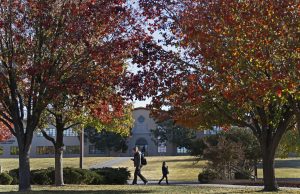New Mexico State University ranks first in the country for federal obligations for science and engineering activities for MSI's according to a report from the National Science Foundation’s National Center for Science and Engineering Statistics.
A high enrollment institution, NMSU led the nation in receiving $48.8 million in federal science and engineering obligations during the 2015 fiscal year. The majority of the funds, 84 percent, were in the research and development category, and 62 percent of the science and engineering total came from the Department of Defense ($11.6 million), NSF ($9.6 million) and NASA ($9 million).
Other institutions listed with NMSU in the top 20 include UTEP, University of Texas at San Antonio, Florida A&M and Florida International.
“This is just another indication of NMSU’s excellence in science and engineering,” said NMSU Chancellor Garrey Carruthers. “It’s appropriate that this recognition comes to a HSI's already known for excellence in the STEM fields.”
Chelsea Garno, a biology graduate student, is conducting NSF-funded research to describe how a cell divides from one to two cells because shortly after the phenomenon was discovered and described in the 1970s, there were no further studies into the contractile ring, until recently.
“The contractile ring is a transient actomyosin structure that forms in the middle of a cell that is highly regulated temporally and spatially. I am working with several proteins, namely Anillin, Septin, Myosin and Actin, to determine the roles of each of these proteins during the first cell division after fertilization in sea urchin eggs,” said Garno, who plans to attend medical school after earning her master’s degree.
Garno encourages students to find research opportunities.
“My advice to any students who are aspiring to do research, regardless of the field, is to reach out to your professors about any research opportunities they are aware of in their field. If they do not have a research lab on campus, they may know someone who does and can get you connected to a research lab that interests you,” Garno said.
Initially introduced to NMSU by a friend who is a graduate, Clara Ross said she choose NMSU for graduate school to study cellular biology, which incorporated her interest in both molecular biology and biochemistry.
“I found NMSU to have knowledgeable and diverse faculty members as well as a wide spread of research interests,” she said. “I have had great experiences working with the undergraduate students, graduate students and faculty. They are open and helpful allowing me to be productive and learn every day.”

